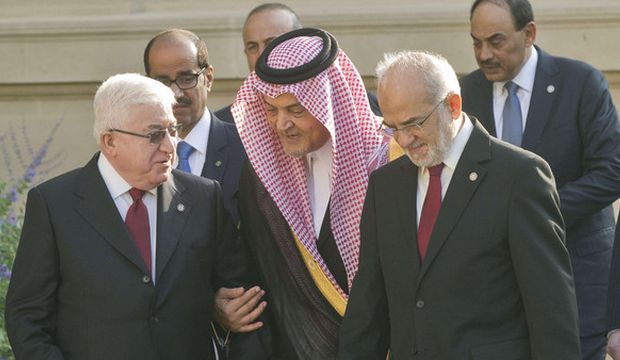
From L-R, Iraqi President Fuad Masoum, Saudi Foreign Minister Prince Saud Al-Faisal, and Iraqi Foreign Minister Ibrahim Al-Jaafari arrive at the International Conference on Peace and Security in Iraq at the French Foreign Ministry in Paris, on September 15, 2014. (AFP Photo/Michel Euler)
Paris and London, Asharq Al-Awsat—The fight against the Islamic State of Iraq and Syria (ISIS) will likely take a decade, Saudi Arabia’s Foreign Minister Prince Saud Al-Faisal told an international summit in Paris on Monday devoted to dealing with the threat of the extremist organization.
Speaking at the meeting—which drew representatives from 30 countries, including the five permanent members of the UN Security Council and nine Arab states as well as Turkey—Prince Saud said: “The fight against terrorism will not end with one battle or in a short time. All the evidence suggests this confrontation will take a long time.”
He added: “Therefore, we see the importance in the continuation of the coalition that will be formed to fight ISIS for at least 10 years so that we can guarantee the destruction of this repulsive phenomenon.”
Following the end of the meeting, the participating countries issued a joint statement expressing their determination to “remove [ISIS] from the regions in which it has established itself in Iraq,” and vowed to provide help to the new Iraqi government in its fight against the group “by any means necessary, including appropriate military assistance.”
In his own statement following the conclusion of the meeting, Russian Foreign Minister Sergey Lavrov said there could be no “double standards in the fight against terrorism, whether it is called ISIS or the Al-Nusra Front or something else.”
He called Iran and Syria the “natural allies in the fight against ISIS,” saying “their participation [in the Paris meeting] could have helped our efforts here.”
Representatives from Iran were not in attendance at the meeting on Monday, despite the presence of military advisors from the Islamic Republic among Iraqi forces.
French sources have said both France and Iraq were keen on Tehran’s presence at the meeting but that “consensus could not be achieved” among all attendees on Iran’s participation due to its “role in Syria and its support of President Bashar Al-Assad, its failure to endorse the aims of the conference, and the lack of clarity regarding its motives.”
An Arab diplomatic source who attended the meeting, speaking on condition of anonymity, told Asharq Al-Awsat that during the closed session Iraqi Foreign Minister Ibrahim Al-Jaafari told the attendees he would have preferred Iran to have been invited to the talks. The source added this came as Jaafari spoke about the importance of regional participation in the fight against ISIS.
Other sources speaking on condition of anonymity told Asharq Al-Awsat that US Secretary of State John kerry, along with Gulf States, were “not pleased with the West’s recent realignment toward Tehran,” insisting that Iran not participate in the meetings.
This comes as a number of Arab countries including Saudi Arabia and Egypt pledged to join a US-led international coalition to fight the extremist group in Iraq, though details of their specific contribution to joint efforts remain unclear.
As for the US, it stepped up its efforts against ISIS in Iraq on Monday night, launching air strikes against positions occupied by the group in what the US military described as the first of a new wave of attacks.
“The air strike southwest of Baghdad was the first taken as part of our expanded efforts beyond protecting our own people and humanitarian missions to hit [ISIS] targets as Iraqi forces go on offence, as outlined in the [US] president’s speech last Wednesday,” a US military spokesperson said.
Additional reporting from London by Adhan Al-Ahmari.
